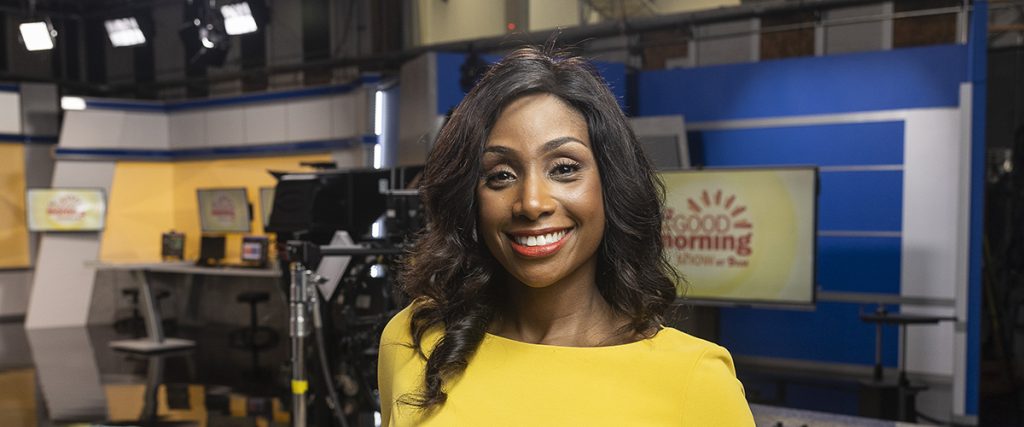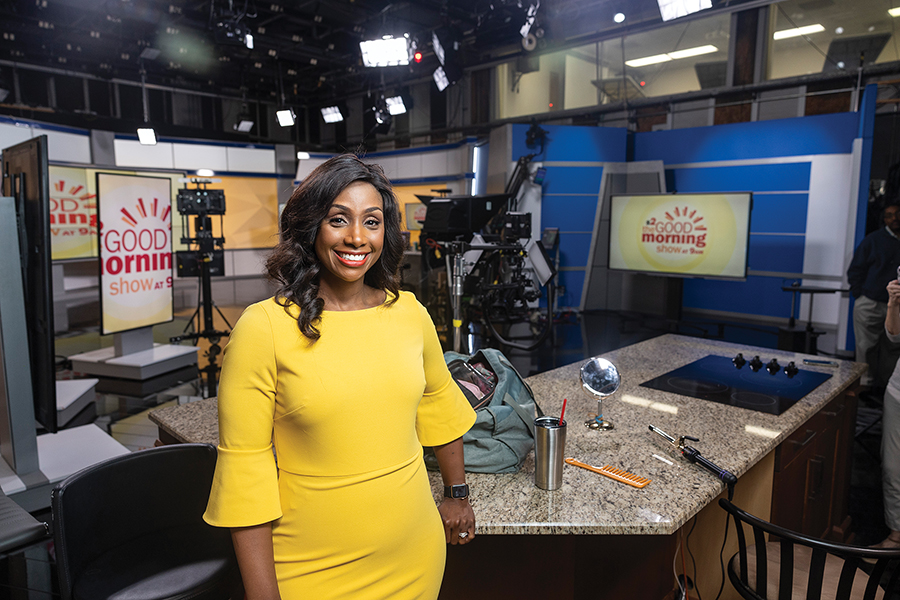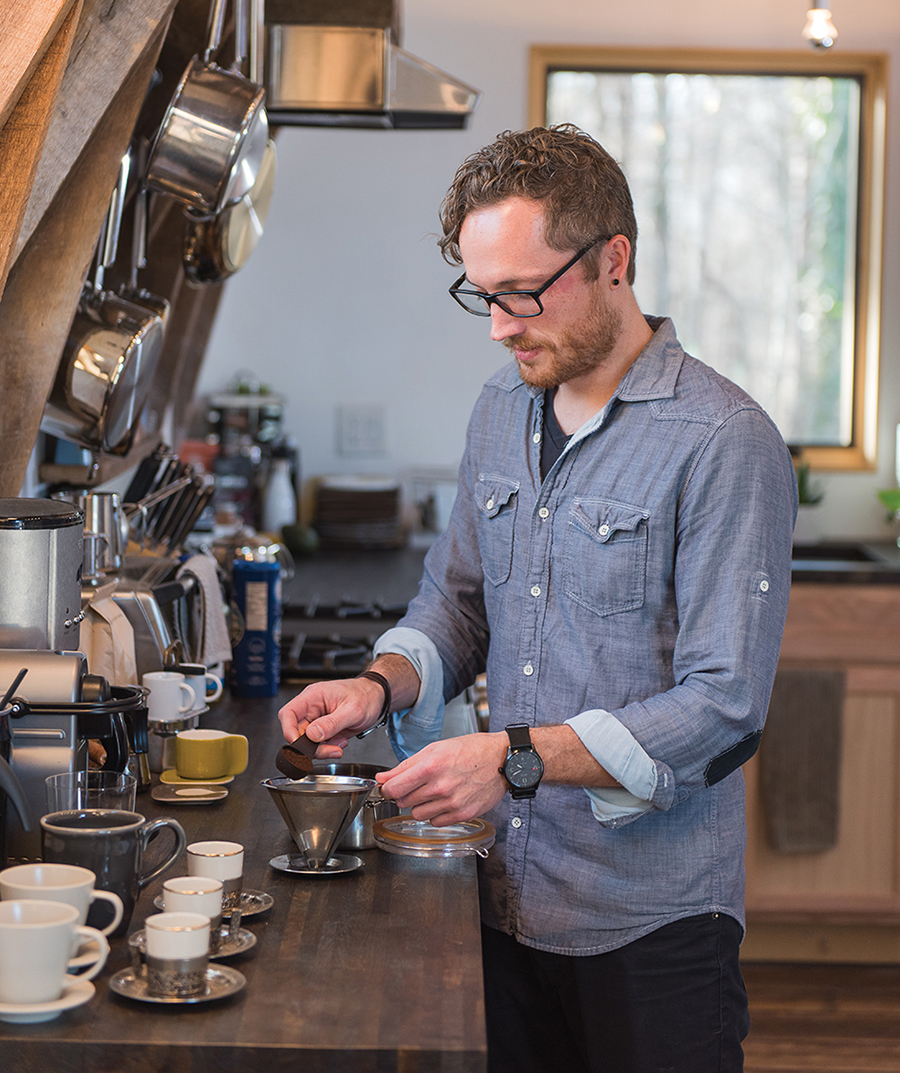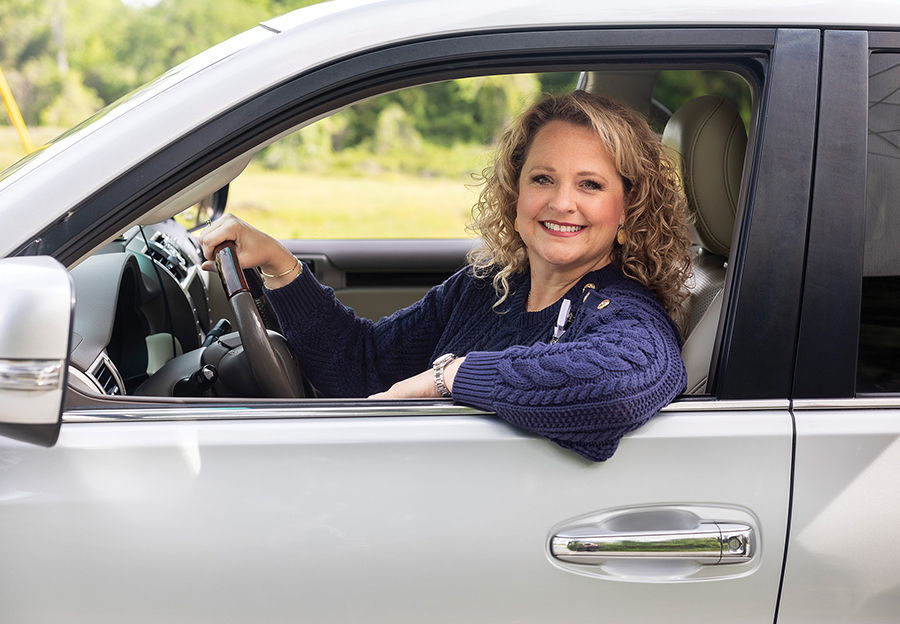
Morning routines that get — and keep — three professionals going
By Cynthia Adams
A newswoman arrives at work at 3 a.m. An architect seeks to establish a natural flow to each day. An on-call nurse routinely leaves her work after daybreak. Their routines share a singular intention: grounding themselves, finding a rhythm with each new day.
Waking up with WFMY’s Tracey McCain

Tracey McCain’s morning-is-breaking, upbeat smile is familiar after appearing on Triad television soon after her career began. Sure, she could have gone to a bigger market — Dallas was interested — but Triad TV viewers should thank their lucky, local star that she decided to come back to her hometown.
Her first stint at WFMY was the weekend Good Morning Show, later moving to weekdays. She now appears on the Good Morning Show, America’s oldest and longest-running morning show.
Since last September, the program now airs in bifurcated segments, first from 4:30–7 a.m., interrupted by the CBS national newscast, This Morning. WFMY’s local program resumes with McCain from 9–10 a.m.
“You know, I quite enjoy it,” she says cheerfully about the added hour. “It’s a different show format, which allows us to tell the news but also relate to our viewers and each other in a nontraditional way.”
McCain says the key to an early bird lifestyle is her husband, Jaron, who juggles a demanding law practice with parenting. “He’s a great dad, and we’re great partners. I don’t think I could do this with anybody else.”
Jaron, who understands what’s required of his wife’s job, continually earns fresh respect.
“He tells me every day, ‘I appreciate you so much.’ I don’t think I could do this if he didn’t.” McCain admits that even a morning lark like her requires a choreographed routine.
It begins with a 2 a.m. wakeup call: “I’m out of my bed and start the process to go from mother-of-the-year to newswoman.”
First, she allows herself one cup of joe — her favorite is Breakfast Blend — light, with cream and a teaspoon of sugar, before reaching the Phillips Avenue station as Jaron, and three young children— ages 2–7 — still sleep.
After nearly two decades, the indefatigable WFMY newswoman, wife and mother says she understands if we feel we know her. Born in Guilford County, McCain graduated from Eastern Guilford High School before earning degrees at the University of Connecticut and Quinnipiac University.
She launched her career at WSHM in Springfield, Massachusetts, moving to WFSB in Hartford, Connecticut, before finding her way home in 2006.
From McCain’s perspective, being in her hometown in a job she loves validates her maternal juggling act.
As part of a high-profile morning anchor team, McCain must be ready to go before the crack of dawn, no matter what.
“It’s just like the postal service,” she jokes, saying she has driven through every type of weather. “Whether there is snow, sleet, rain, hurricane or a tropical storm.”
All part of the job.
But she leaves little to chance. In order to get out the door on time, McCain has developed a strict routine that seldom wavers. Hair, makeup, everything is done before walking into the studio. “And I pack my bag and I’m out the door.”
“I’m into fitness. Healthy attitudes and healthy meals. So, I prepackage my meals the night before so I don’t have to think about it.”
Not only meals, mind you, but snacks to power her until the early afternoon. “I make certain I have my necessary amount of water — everything I’ll need.”
There is scarce opportunity to leave.
“If there’s breaking news — shootings like this week — I have no time.”
Once settled into a work rhythm, McCain allows herself a second cup of coffee before broadcast, mindful that she will be on live television for the next two-and-a-half hours.
Fortunately, the early hours of the day are her favorite.
“I’ve always been a morning person,” she declares convincingly, although it is nearing noon and she admittedly longs for a quick shut-eye. A radiant smile breaks again. “I’ve been waking up at 2 a.m. for 15 of those [last] 18 years. On off-days, I sleep in until 6 a.m. I can do a lot in an hour before the kids are up — laundry or cook a meal.” Even at rest, she even keeps a notebook bedside for jotting down ideas.
Her evening routine? While getting her kids ready for bed, McCain addresses things like her next day’s wardrobe. “I’ll set their toothbrushes up and go into my closet and choose what I’ll wear. Kids lunches are made.”
Finally, she says, “My night ends after the last child goes to bed. That could be 9 or 9:30 p.m. I have extreme child guilt, like most moms do, because I’m not there for the mornings . . . I don’t want to miss a thing. So, I want to be there for them.”
Recalling her own upbringing, McCain says, “My parents gave me the best childhood! My mom made dinner every night. I try to do that for my kids.”
She reads with her children nightly, marveling over oldest son Josiah’s thinking and problem solving. Her daughter, Simone, 5, “dances and sings,” McCain praises. Her youngest, Julian, “is super tall, super-fast, he’s like lightning. He wants to be like his older brother . . . If I say ‘the baby,’ he says, ‘I’m not the baby! Who’s the baby?’”
At midday, moving into “mom mode,” McCain’s energy falters. Yes, she answers. She is sleep-deprived all the time.
“I learned how to function with great coffee and naps. Sometimes I’ll take a nap in the carpool lane as I’m getting my child. The teachers know,” she says, smiling broadly. “If they see my car, they know I’m probably taking a nap.”
Keys to her productivity, besides cat naps, are a healthy diet and high intensity interval training.
McCain so believes in her fitness routine she became a certified personal trainer forming a partnership with AWOL Fitness in Greensboro called “Train with Tracey.” She teaches classes Mondays and Wednesdays at 6 p.m., and Saturday mornings at 9 p.m. “I pour daily motivation into them.”
McCain reminds, “This is a great day to have a great purpose/time and have a great time with great people. I use ‘great’ all the time.”
She makes it a point “to be kind/nice/respectful of everyone, including myself,” she texts after work one afternoon. “And I’m going to love my children from the time they wake up until they go to bed. And love my husband. I’m a positive, happy, person.”
Although her friends call her “superwoman” McCain is realistic. “I’m selective. I cannot do it all.”
“I don’t know why, but for some reason, people think I’m a diva,” she says, shaking her head. “I’m not! I’m so down-to-earth.”
What is most challenging about being a local celebrity?
She responds to actor Rob Lowe saying he likes going out in public, wearing a ball cap and seeing if he is spotted, which he calls “giraffing.”
McCain enjoys being recognized. “If I’m wearing a hat, it’s not because I’m hiding . . . it’s because I’m having a bad hair day. You live in the South! My grandmother said hello to everyone — so I do!”
She relies upon feedback from viewers, but best of all, Josiah. Before Jaron drops him at school, he watches a few minutes of the Good Morning Show.
As if part of his own morning routine, her son calls her every morning, with his own positive affirmation. “He says, ‘Great job . . . you really did a great job!’”
McCain swallows. “I mean, what a sweetheart!
“He’s learning from my husband.”
Mornings with Michael Clapp, Architect and Artist

Michael Clapp has two nonnegotiables in his workday routine: caffeine in a cup and crunch in a bowl.
The 30-something architect and visual artist doesn’t even want to imagine a morning that doesn’t include espresso and at least a few bowls of his favorite Honey Nut Cheerios while he digests the news on his iPad. Maybe, he adds with a small laugh, he’ll have three or four bowls of cereal with milk.
As a naturally slender man, this requires confirmation. But Clapp isn’t kidding.
“I’m very much a morning person,” he says. “I love the feeling of getting an early start to things and hate the feeling of getting up late and having to rush through my morning preparations and out the door.”
A typical morning begins with only two cups of his go-to. An Italian espresso machine is one of the hardest working appliances in his tidy kitchen.
Clapp, a full-time architect with STITCH Design Shop, has worn other hats. He has been a lecturer in the School of Architecture at UNC-Charlotte, while also starting his own firm, Schemata, having earned a master’s degree of architecture at Harvard. His Whitsett barn conversion, “Resonant Dwelling,” appeared in the March 2019 O.Henry. In the October 2021 issue, I wrote “His Father’s Son” about a cabin retreat of his design, a collaboration with his father, who also works in a creative field as owner of an advertising agency.
So, what is his morning routine like? Variable. “So, to speak to your question . . . it’s complicated! I would say I had a much different morning ritual when just working for myself at Schemata than I do now that I work full-time [in addition to maintaining a few jobs specific to Schemata] for STITCH Design Shop.”
If there is such a thing as an “ideal scenario,” Clapp describes it as this:
“I’d get to bed at a reasonable hour such that even if setting an alarm, I’d generally be able to wake up naturally around the proper time to allow a slow easing into the day.” He loves taking a quick walk outside before doing anything else. “And in the winter [especially if there’s snow] it’s something that makes such a difference to how the rest of the day goes.”
On weekends, Clapp pulls on boots and heads out for a walk, “even before cereal and news.”
Yoga helps him “feel more centered throughout each day” when he can work it into his schedule.
Now, with assorted meetings, travel and sundry work requirements, Clapp finds himself lucky “if I can get to the downtown Greensboro YMCA gym before making it to the office.”
The demands of his exacting work and art can complicate his daily rituals. An out-of-the-ordinary day may have him taking an early morning sauna [he’s building his own at home] and sweating a deadline that afternoon. But, when life is in balance, there’s a natural stasis — an equilibrium.
What follows is well-known as “flow state,” which is almost effortless creativity and the ultimate achievement within a well-calibrated day. “Uninterrupted time,” he clarifies, is critical to entering this sought-after, creative and relaxed state of mind.
“Uninterrupted time . . . that luxury,” Clapp repeats and sighs.
When working, sketching or drafting, Clapp is very methodical. Creatives often report that when achieving the flow state their work is almost unconscious — having attained a mental state from which their work simply flows, hence the term.
All thanks to an equilibrium that for Clapp begins simply and ritually with a leisurely cuppa and a bowl of cereal. While outwardly simple, such things are significant. Clapp is seeking mindfulness and “healthy ways of living habitually.”
There is a fully-caffeinated coffee in his hand although it is late afternoon. No worries, he reassures. He can even enjoy a late-night coffee and sleep deeply.
And with that, he walks back to his office, returning to put the finishing touches on a project, renderings he says he cannot wait to show favorite clients.
Daybreak reflections with Jessica Smith, R.N.

On-call hospice nurse Jessica Smith lives with an upside-down schedule: Mornings mark the end of her workday — not the beginning.
Smith works after hours, on call while her family, like much of the city, is tucked into bed. So, the trick for her is to create some semblance of a morning routine during the work week before she, too, finally rests.
As day breaks, mornings often vacillate between peaceful and chaotic — seldom predictable or routine. And yet, she says, “I’m so thankful for my job. Not everybody gets to experience the full circle of life. I do. How precious are our lives?”
Smith has been at Authoracare Collective for 17 years, working in the Triad “and as far as King, Madison, Mayodan, Sophia, Wilson and Chapel Hill.” She sings as she drives, centering herself.
Her blonde curls, blue eyes and cherubic face resemble a pre-Raphaelite painting. At first meeting, family and patients often assume she is younger, asking, “How long have you been doing this?”
Smith, approaching 20 years in her job, hopes her longevity reassures. “They say it does.”
“I’m going to be calm for the family,” she says. “Nothing’s an emergency with hospice.” Her equanimity improves her patients’ experience. This requires establishing a routine which helps her find this.
Her blue eyes reflect this, pools of surprising serenity.
“If you’re not calm, the family’s not calm. And you have to be the quiet authority.” This propels her through long nights when she responds to calls that take her into varying situations and needs.
So, with each daybreak, the previous night dictates her morning routine. Sometimes, family members are waking up to discover their loved one has died, she explains. Or a patient is nearing the end. Her schedule varies out of necessity. After each night shift, Smith completes patient notes for the primary nurse and social worker before returning home for a brief walk, some devotional time to reflect and then, finally, sleep.
On difficult mornings, coffee must wait. Otherwise, Smith logs 3 miles in the morning, squeezing in a 1-mile walk when it isn’t. She takes Zumba and Peloton classes. Her Yorkie, Lexie, knows exactly how to give comfort when needed after a difficult night.
With years of experience, Smith is exquisitely aware of life stages. She can anticipate a patient’s end of life.
Sensing that death is nearing, she remains even when the family tells her she can leave. “No, I’ll stay,” she gently insists.
Smith formerly worked as an oncology nurse, seeing patients daily. On-call, she sees many different patients, often for the first time.
While in nursing school, she had to inform her own father that he was dying. “He had the look. That is just one of those things . . . I knew.”
“I told him, it’s not going to be long — Thanksgiving was when he entered hospice care. He looked at me and asked, ‘Do I have till Christmas?’ I said no.”
Smith’s father died at the end of that November. Her honesty allowed time for important things to be said.
Originally, she studied voice. But by age 26, she discovered her true calling was nursing the critically ill.
As for singing? She is a fan of gospel singer Cee Cee Wynans’ Goodness of God. “I try to listen to it every day and it reminds me of where I’ve been and thankfulness: You’ve made it through.”
Smith often sings for an audience of one.
“Even patients — and I hope it doesn’t sound creepy — we have patients who are wards of the state and they don’t have family, and they’re alone,” says Smith. “And I sometimes sing to them when they die. Even afterward.”
“In the middle of the night, they [the family] call because they’re in a crisis. And I make them feel better, but I’m not the primary nurse.” For that reason, she speculates that no one will remember her. No matter.
Her eyes soften. “I’m in service to something bigger than myself. I could go in my pajamas and not brush my teeth and they [the patient and family] would be just be grateful I’m there. Of course, I don’t do that,” she adds.
Well-dressed, her blonde curls tamed, Smith assumes the mantle of reassuring professional, navigating an incredible journey with families and patients. This journey, according to her, “is some of the most precious times you will ever have, apart from being born.”
It struck her from the beginning that death is a great equalizer. “It all comes down to [my] being by the bedside. I would go to one home in Smith Homes, and one home in Irving Park. And they all end the same way,” she observes.
After a hard night of helping a patient reach that end as peacefully as possible, Smith allows herself time — time to love herself and critique what she can do better, she explains. She sings, too, often unaware she is singing.
On free days, Smith sleeps in a bit. “The only difference is, I don’t go back to sleep after I walk. I try to set aside a little time with Jackson, my son. We sit and talk a lot.”
She remarried seven years ago, acquiring two “bonus” children in addition to her two sons, including a daughter, Krista, who had Type 1 diabetes.
“She was fascinated by death,” says Smith — especially hospice work.
In 2020, 17-year-old Krista passed away unexpectedly in her sleep.
“It was a good death,” Smith says softly. “Peaceful. There is no better death than that.”
At the urging of Krista’s older brother, Caeleb, the family established the Krista Smith Foundation in support of juvenile diabetes.
“What helps me is the work I do, and knowing how short our lives are. And that we are living exactly as long as we are supposed to. It has helped me be a better hospice nurse.”
Come nightfall, Smith will do it all again. OH
